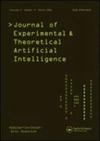非分离数据的改进PSO聚类
IF 1.7
4区 计算机科学
Q3 COMPUTER SCIENCE, ARTIFICIAL INTELLIGENCE
Journal of Experimental & Theoretical Artificial Intelligence
Pub Date : 2021-08-27
DOI:10.1080/0952813X.2021.1970238
引用次数: 2
摘要
聚类分析是大数据分析中最流行的,也是最重要的任务,因为它有助于揭示数据中隐藏的模式和趋势。传统的单目标聚类技术往往存在精度波动,特别是当应用于不同密度和分布不平衡的数据组以及存在异常值时。本文提出了一种多阶段聚类解决方案,即使在有噪声和非分离数据(线性不可分离数据)的情况下也能获得良好的精度测量。提出的设计结合了两阶段粒子群优化(PSO)聚类与K-means逻辑和最先进的离群值去除技术。在PSO聚类的两个阶段使用两种不同的优化准则,使模型能够在收敛过程中逃脱局部最小陷阱。在大量数据的实验中,该系统可以达到高达99.9%的准确率,在未分离的数据上平均达到87.4%。该模型还被证明在基本聚类问题套件(FCPS)的10个数据集中的8个数据集上具有鲁棒性,FCPS是聚类算法的基准。本文章由计算机程序翻译,如有差异,请以英文原文为准。
Refined PSO Clustering for Not Well-Separated Data
ABSTRACT Cluster analysis is the most popular and often the foremost task in big data analytics as it helps in unearthing hidden patterns and trends in data. Traditional single-objective clustering techniques often suffer from accuracy fluctuations especially when applied over data groups of varying densities and imbalanced distribution as well as in the presence of outliers. This paper presents a multi-phase clustering solution that achieves good accuracy measures even in the case of noisy and not- well-separated data (linearly not separable data). The proposed design combines a two-stage Particle Swarm Optimisation (PSO) clustering with K-means logic and a state-of-the-art outlier removal technique. The use of two different optimisation criteria in the two stages of PSO clustering equips the model with the ability to escape local minima traps in the process of convergence. Extensive experiments featuring a wide variety of data have been carried out and the system could achieve accuracy levels as high as 99.9% and an average of 87.4% on notwell-separated data. The model has also been proved to be robust on eight out of the ten datasets of the Fundamental Clustering Problem Suit (FCPS), a benchmark for clustering algorithms.
求助全文
通过发布文献求助,成功后即可免费获取论文全文。
去求助
来源期刊
CiteScore
6.10
自引率
4.50%
发文量
89
审稿时长
>12 weeks
期刊介绍:
Journal of Experimental & Theoretical Artificial Intelligence (JETAI) is a world leading journal dedicated to publishing high quality, rigorously reviewed, original papers in artificial intelligence (AI) research.
The journal features work in all subfields of AI research and accepts both theoretical and applied research. Topics covered include, but are not limited to, the following:
• cognitive science
• games
• learning
• knowledge representation
• memory and neural system modelling
• perception
• problem-solving

 求助内容:
求助内容: 应助结果提醒方式:
应助结果提醒方式:


